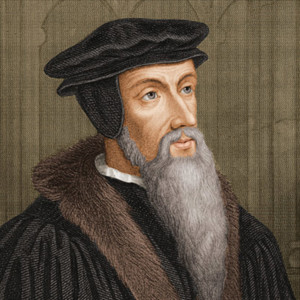Reformed Christianity

John Calvin, French theologian and major figure in the development of Reformed Christianity.
This is a Christian Protestant denomination, also called Calvinism, after its founder, John Calvin.
The Reformed church was one of the results of the Protestant Reformation. It’s name is coincidentally related to the Reformation itself. The Catholic church referred to the denomination as “Calvinism” (somewhat pejoratively), and that name is often still used.
There are two major branches: Dutch Reformed and German Reformed.
Reformed theology has five tenants or doctrines, represented by the acronym TULIP:
- Total depravity: man is born into the slavery of sin, and can only resist through the grace of God
- Unconditional election: those saved and those damned are predestined by God; He selected the “elect” in advance (the opposite of this is reflected in so-called “Arminianism,” where the predestination is God’s grace and salvation for the believer, but each person can freely choose whether or not to accept it)
- Limited atonement: Christ died only to repent for the sins of the elect, not all people
- Irresistible grace: God’s grace is irresistible, and it is what causes the salvation of the elect
- Perseverance of the saints: those truly born again will never cease their belief, and doing so is proof of a lack of genuine conversion
There are two major organizations of Reformed churches in the United States:
- Reformed Church in America (this is colloquially known as the “Dutch Reformed Church”)
- The Christian Reformed Church in North America
Why I Looked It Up
My children attended a Dutch Reformed Christian school (it was previously named “Calvin Christian School”). My son still attends a Dutch Reformed church. I never quite understood what it meant.
Postscript
I’m reading The Covenant by James Michener, which is a history of South Africa and the Dutch experience there. It’s fiction, but there’s a passage where a character thinks about Unconditional Election:
[…] French Calvinism was a quiet, stable, often beautiful religion in which a human being, from the moment he was conceived, was registered in God’s great account book as either saved or damned. He would never know which, but if life smiled on him and his fields prospered, there had to be a supposition that he was among the saved. Therefore, it behooved a man to work diligently, for this indicated he was eligible to be chosen.
Postscript
Added on
I did some looking for Bible verses that supported Unconditional Election. I found these:
Ephesians 1:5: He predestined us for adoption to himself as sons through Jesus Christ, according to the purpose of his will
Ephesians 1:11: In him we have obtained an inheritance, having been predestined according to the purpose of him who works all things according to the counsel of his will.
Galatians 1:15: But when he who had set me apart before I was born, and who called me by his grace.
Jeremiah 1:5: Before I formed you in the womb I knew you, and before you were born I consecrated you; I appointed you a prophet to the nations.
Romans 8:28-30: For those whom he foreknew he also predestined to be conformed to the image of his Son, in order that he might be the firstborn among many brothers. And those whom he predestined he also called, and those whom he called he also justified, and those whom he justified he also glorified.
Postscript
I was watching a documentary about White colonialism, and it mentioned that the Dutch in South Africa felt that since non-Whites were born into poverty and were considered “savages,” that was proof that they were not God’s elect. Conversely, White people were born into more wealth, civilization, and success, and therefore they were obviously part of the elect.
No citation or documentation was given for this.